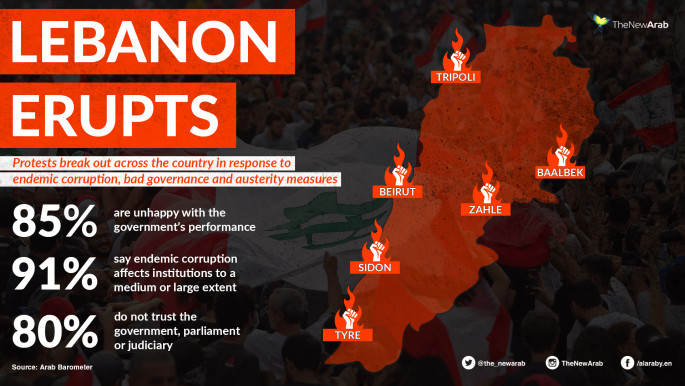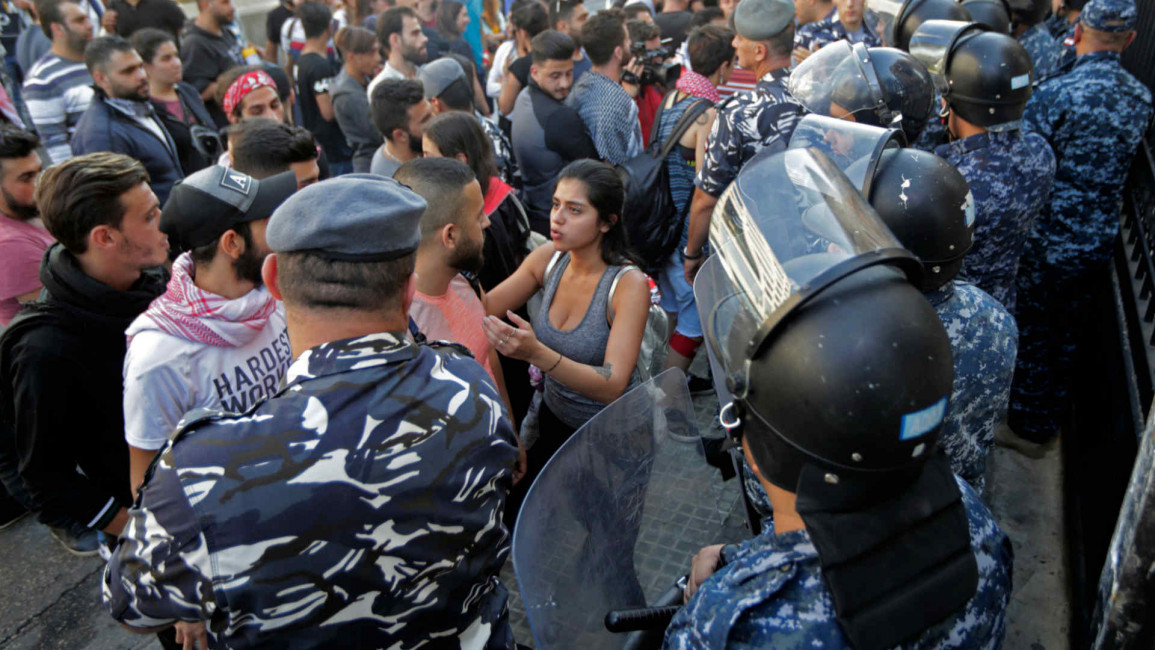Lebanese banks, schools shut as thousands continue protests against ruling elite
Protesters tried to prevent employees from clocking in at state institutions nearly one month into an anti-graft street movement.
Lebanon's President Michel Aoun will appear in a television interview to discuss "current developments" on Tuesday evening - the 27th day of protests - the Lebanese presidency announced on Twitter.
Unprecedented protests erupted across Lebanon on 17 October, demanding the ouster of a generation of politicians seen by demonstrators as inefficient and corrupt.
The government stepped down on 29 October but it remains in a caretaker capacity as no overt efforts have been made to form a new one.
Dozens of protesters gathered near the Palace of Justice in central Beirut on Tuesday morning, demanding an independent judiciary as they tried to prevent judges and lawyers from going to work, an AFP correspondent said.
According to the Lebanese National News Agency, scuffles broke out between some of the protestors and a lawyer who tried to enter the Palace of Justice.
A number of students also gathered in front of the Ministry of Education, The New Arab's Arabic-language service reported.
In the town of Aley east of Beirut, in the southern city of Tyre, and the eastern town of Baalbek, demonstrators held sit-ins outside and inside the offices of the state telecommunications provider, local media reported.
Meanwhile, President Aoun met ambassadors from the International Support Group for Lebanon and briefed them on his position regarding the protests.
"Very soon there will be a Lebanese government ready to implement the planned reforms for the current crisis", Aoun said according to Anadolu Agency.
 |
Many schools and universities were closed Tuesday, as were banks after their employees called for a general strike over alleged mistreatment by customers last week.
Despite the Minister of Education's directive to keep schools and universities closed, some ignored the order and opened their doors to students.
The New Arab's Arabic-language service also reported that employees of the two mobile network operators, Alpha and Touch, started an open-ended strike today.
The leaderless protest movement first erupted after a proposed tax on calls via free phone applications.
Banks have restricted access to dollars since the start of the protests, sparking fears of the devaluation of the local currency and discontent among account holders.
The central bank on Monday however insisted the Lebanese pound would remain pegged to the dollar and said it had asked banks to lift restrictions on withdrawals.
Students, who have emerged as key players in the uprising, are expected to ramp up their demonstrations later in the day ahead of the presidential address in the evening.
Since its inception, the protests have morphed into an unprecedented cross-sectarian outcry against everything from perceived state corruption to rampant electricity cuts.
People in the street say they are fed up with the same political families dominating government institutions since the end of the 1975-1990 civil war.
Protesters are demanding a fresh cabinet include independent experts not affiliated to traditional political parties, but no date has yet been set for required parliamentary consultations.
Read more: Why Gebran Bassil is the most reviled politician in Lebanon today
Government formation typically takes months in Lebanon, with protracted debate on how to best maintain a fragile balance between religious communities.
The World Bank says around a third of Lebanese live in poverty, and has warned the country's struggling economy could further deteriorate if a new cabinet is not formed rapidly.
Follow us on Twitter and Instagram to stay connected



